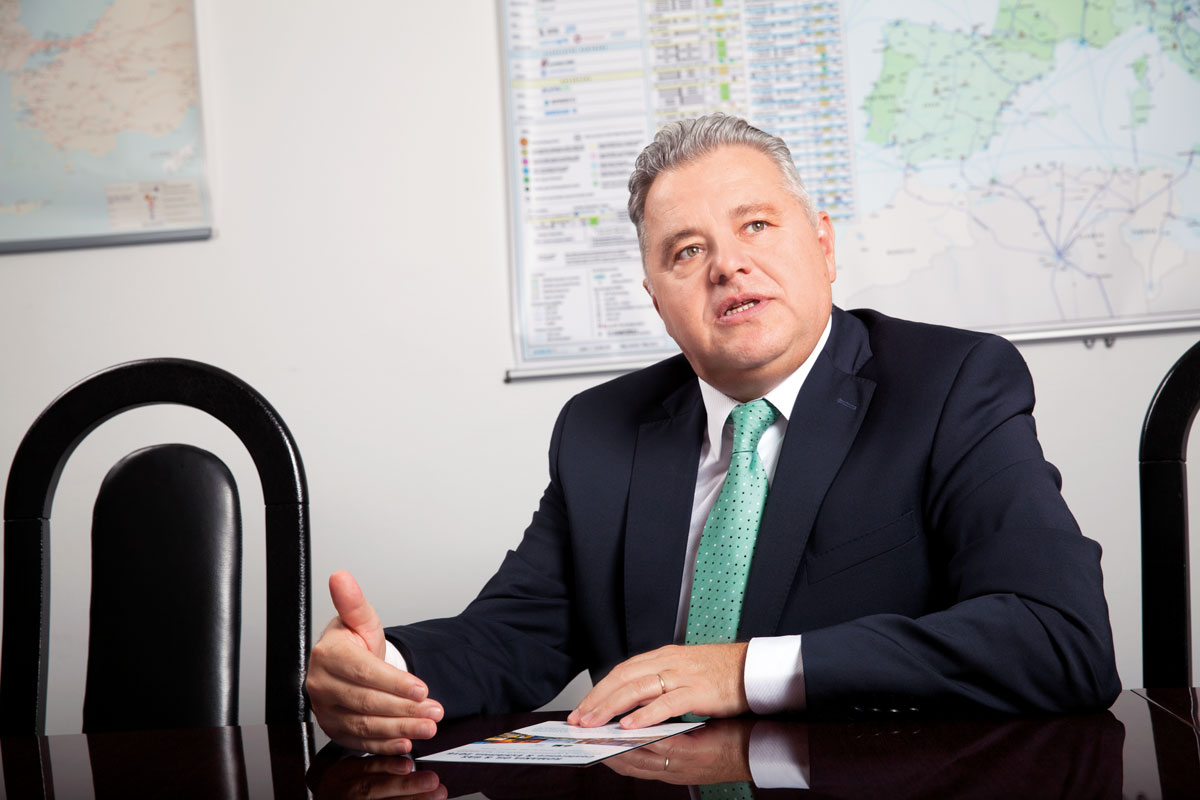Niculae Havrilet: European energy interdependence, best way to security and energy independence
Last Spring, the President of ANRE (National Energy Regulatory Authority), Niculae Havrilet, announced that Romania will no longer depend on Russian gas imports. Meanwhile, as the situation evolves, ANRE President provides updated comments on the current status of the national natural gas market, changes made by new legislation in the field, and ANRE’s contribution in terms of ensuring a predictable and stable regulatory framework to encourage investments.
Mr. President, how is the Romanian natural gas market positioned at European level?
Niculae Havrilet: The natural gas industry in our country has a history of 100 years, Romania having today the largest natural gas market in Central and Eastern Europe in terms of annual gas production, available natural gas reserves and natural gas infrastructure. Also, Romania is ranked among the three most natural gas-independent states in the European Union, most of its consumption being covered by internal production.
- As a primary energy source, natural gas has a significant importance on the internal energy market and this is the result of:
- A relatively high level of natural gas reserves, as well as the perspectives regarding new fields discovered of tradable offshore gas resources;
- Low impact on natural gas environment compared to other fossil fuels and the complementary nature against electricity produced from renewable sources;
- The existent infrastructure for gas extraction, transmission, underground storage and distribution extended across the country;
- Romania’s favourable position in international gas transmission system in Central and Eastern Europe and the possibility of interconnecting the national gas transmission system with West-European system and the gas resources of the Caspian and Middle East.
Following the checks conducted by the EU Commission, our country has been accused of blocking the gas sales on the European Union domestic market. Is Romania ready, including from the technical point of view, to comply with European regulations and with the energy policy on exports? Is Romania interested in doing this?
Niculae Havrilet: By diversifying the natural gas infrastructure and the possibility to export, Romania can have the opportunity to take part in strategic projects at EU level.
The EU Strategy for completing the Single Market along with Romanian Interconnection Strategy of the National Gas Transmission System with the transmission systems of the neighbouring countries imposed to starting some new interconnection projects. In this regard, the most important step has been achieved by completing the project regarding the point of interconnection Csanédpalota (Hungary) that involved the construction of a natural gas transmission pipeline and its related installations, in order to transmit natural gas to and from Romania. It allows natural gas exports and access to European gas markets.
Romania needs to diversify its natural gas supply resources, try to become an important geopolitical vector as a result of energy routes crossing the Wider Black Sea Region, in order to create an interconnection system that would lead to mutual support for distributing resources among Member States, as the best way to achieve security and energy independence is by establishing a European energy interdependence.
- The most important projects to follow during the next period for the development of gas transmission infrastructure refer to:
- The completion of the project interconnecting Bulgaria to Romania and ensuring the bidirectional flow of natural gas at Giurgiu-Ruse interconnection point, expected to be completed by the end of 2016;
- Interconnecting the national gas transmission system to international gas transmission pipelines and to ensure bidirectional flow at the Isaccea cross-border interconnection points, the project expected to be completed in 2016;
- The development on the Romanian territory of the Central Transmission Corridor for taking over gas from the Black Seashore;
- The interconnection opportunity by building the Trans Adriatic Pipeline (TAP), a project that creates the possibility to transmit Caspian gas (Azerbaijan) to the southern border of Romania. Connecting with the Trans Anatolian Pipeline (TANAP) at the Greek-Turkish border, TAP will cross Northern Greece, Albania and the Adriatic Sea before coming ashore in Southern Italy to connect to the Italian natural gas network and further to Western Europe.
Which are ANRE’s priorities in order to ensure energy security and the sustainable development of national resources?
Niculae Havrilet: Energy has become a strategic factor in global politics, a vital component for economic development and the progress of a society as a whole generating a number of concerns worldwide. Currently, oil and gas, as components of energy, represent the greatest challenge and, at the same time concern, not only in Europe but also worldwide. This depends on many factors: the level of gas reserves in the field, the countries managing these reserves, their policy, the geopolitical environment, the economic and diplomatic power.
Energy security is defined as the way energy is supplied, at affordable and stable prices, through protected critical infrastructures, helping to sustain and enhance economic performance. Lately, the term ‘energy security’ is more and more discussed upon, being considered the key to global security, any failure of critical energy infrastructure having a potential political, military and social impact.
Due to aging infrastructure, increased costs and a reduce deficiency throughout the chain of production-transmission-distribution until the final product reaches the consumer, Romanian energy system risks and vulnerabilities are found in all stages such as production, storage, transmission and distribution. Plus an inability recognized in recent years determined by the fact that there are few studies conducted in the energy sector showing how to improve an aging infrastructure, the developing of a coal sector infrastructure, the discovery of new deposits in line with the environmental standards imposed at EU level.
In this context, the major objectives of the energy policy in order to ensure energy security are: security of supply, infrastructure development and modernization to support energy diversification, increasing competitiveness on energy market and promoting electricity produced from renewable sources.
What percentage of gas is currently traded on the stock market? How will this share evolve in the near future?
Niculae Havrilet: By Order No. 118/2014, ANRE approved the Methodology for establishing the obligation of producers and suppliers of natural gas to trade on the centralized markets in Romania, for the period 1 January 2015 – 31 December 2018. Based on the assumption that voluntary participation on centralized gas markets will experience an increase as a result of finding the benefits of the transparent gas trading in those markets, the percentages representing the trading obligations incumbent on producers and suppliers of natural gas is expected to decrease gradually, each year, up to and including 2018.
According to the provision of the Methodology, producers of natural gas – holders of the petroleum agreement have the obligation to conclude, during 2016, transactions on natural gas centralized markets in Romania, in a transparent and non-discriminatory way, for the sale of natural gas amount to at least 30% of its own domestic production intended for domestic consumption. Also, gas suppliers are required to conclude transactions on natural gas centralized markets in Romania for selling/buying quantities of natural gas at least 25% of the total natural gas sold each year on competitive gas.
What can you tell us about the development of the centralized gas markets in Romania? What levers can ANRE pull to support the gas trading participants on centralized markets?
Niculae Havrilet: In 2013, licenses were granted for management of centralized markets to Romanian Commodities Exchange (Societatea Bursa Romana de Marfuri) – BRM respectively Electricity and Natural Gas Market Operator ‘OPCOM’ SA. During the last years, regulations issued for trading gas on centralized markets have undergone amendments and completions, both due to developments occurring in national legislation and amid the diversification of products and trading platforms made available to the market by the operators of centralized natural gas markets. In terms of product diversification and trading platforms available to market operators centralized natural gas markets, we highlight the following developments:
- The launch by the Romanian Commodities Exchange Society (Romanian Commodities Exchange) SA of the electronic trading platforms STEG (BRM), which is a supplementary electronic trading system existing platform, which operates in parallel with it. The new system is exclusively dedicated to natural gas transactions on short, medium and long term between economic operators, license holders of natural gas supply and showing a functional structure different from the existing platform and novelty items;
- Creating conditions for trading of goods with a delivery period of less than one month and facilitate access to trading on the centralized market managed by the Romanian Commodities Exchange Company (Romanian Commodities Exchange) SA by eliminating the disclosure requirements for guarantees participation sessions auctions market participants centralized gas and introduction of the whitelist concept;
- Expanding the scope of the concept ‘participant to centralized market’ and to the wholesale clients, the final customers of natural gas and operators of natural gas purchasing natural gas, thus providing this category of participants the possibility to conclude transactions for the purchase of gas on the centralized market administrated by OPCOM SA;
- Empower the centralized market administrated by OPCOM SA to undergo trading of bilateral contracts proposed by the initiators of trading sessions in accordance with their technical, economic and trade requirements in a centralized, transparent and non-discriminatory way, using the mechanism of public auction.
Recently, following the ANRE request to amend the current legal framework, the government has frozen the liberalization timetable. What are the most important consequences of this decision?
Niculae Havrilet: Following the entry into force on June 30, 2016 of the Government Decision No. 461/28.06.2016 amending the Government Decision no. 488/2015 on establishing the purchase price of natural gas from domestic production for household consumers and thermal energy producers through which the Romanian Government decided to maintain the value of the natural gas price from domestic production at RON 60/MW for the period July 1, 2016 – March 31, 2017, ANRE Regulatory Committee approved an average 3% price reduction for the regulated natural gas supply to household customers for the same period, an average calculated as per the weight on the natural gas market of each supply license holder.
In addition to maintaining the current domestic production price at 60.00 lei/MWh, the approved reduction was considered with a view to ensuring that the natural gas used by household customers is 100% of domestic production (current and extracted from storage facilities) as well as to reducing the estimated unitary transmission cost.
On the occasion of FOREN 2016 you said that imported gas will have, during the coming winter, a price by 20% lower than the stored one, from domestic production, in which case imports will be the best option (more than 30% of consumption) to the detriment of stored gas. In this case, what will happen to domestic suppliers? How can any supply difficulties be avoided during the cold season? What steps will ANRE take to solve the problem? How dependent is Romania in energy terms on the natural gas market?
Niculae Havrilet: Recently, the Minister of Energy drafted an Emergency Ordinance amending the Electricity and Natural Gas Law no.123/2012 in which it is expressly stated that the minimum stocks of natural gas stored by each supplier are set annually through decisions issued by ANRE.
According to the draft, the new regulation enables ANRE to determine annually the minimum level of gas stock that each licensed supplier has the obligation to store to guarantee the security of gas supply in winter, with consideration mainly of existing storage capacities, consumption forecast, frequency and duration of periods with low temperatures, ensuring a level corresponding to domestic consumption.
Regarding the obligation of natural gas storage, the situation this year is similar with the one in the past years. There are about 150 million cubic meters natural gas currently stored in our deposits in addition compared to the quantity stored in the same period of last year. However, although our storage facilities can be 100% full, Romania cannot be entirely gas-independent as we have to consider the possibility that in extremely cold winter circumstances the domestic production and the quantities stored may not cover the demand thus triggering the need to import gas as a consequence. To prevent interruption of natural gas supply under such extraordinary circumstances, as of this year, ANRE issued new regulations setting up the obligation for Transgaz to import natural gas to ensure the system balance during difficult periods.
What new provisions/amendments does the latest ANRE order (no. 31/07.06.2016), regarding the establishment of regulated tariffs for natural gas transmission, include?
Niculae Havrilet: The changes brought by ANRE Order 31/2016 were made in order to enhance the proper functioning of the natural gas market in Romania with a view to its integration in the European internal market national as well as to ensure non-discriminatory third party access to the entry/exit points of the natural gas transmission system.
For the aforementioned purposes, changes focused mainly on:
- Significantly reduce the impact of NTS imbalances and related costs, the possibility of balancing between points to the same group;
- Facilitate cross-border trade of natural gas;
- Facilitate access to transmission services in the short run, correlated with the reduced multiplier coefficients already approved for the current regulatory year (2016-2017);
- Reduce differences between the income approved for the transmission activity and the one obtained;
- Implications with positive/negative impact on the cost of the gas transmission network users depending on the source of the natural gas, correlated with the NTS entry points and the natural gas destination correlated with the NTS exit points.
This spring, during the SEE Upstream 2016 conference, you underscored the day’s topic for ANRE – the completion of the gas market liberalization, noting the beneficial effects of total market deregulation, both for consumers and investors. What is the current situation on this issue?
Niculae Havrilet: As the liberalization process became more advanced, the number of participants in the Romanian natural gas market has grown steadily, especially in the domain of natural gas supply. And with the completion on January 1, 2015 of the internal natural gas market liberalization for non-household customers, the number of customers exercising their eligibility rights increased significantly.
Thus, if in 2014 the number of non-household customers switching the supplier was 10,558 in 2015 their number increased to 188,156. And this, in my opinion, is both relevant and encouraging.
Which is ANRE’s contribution in terms of ensuring a predictable and stable regulatory framework to encourage investments, especially in the current context of low oil prices? Which were for ANRE the challenges of the former gas year, the most serious impediments and what do you plan to accomplish in the future?
Niculae Havrilet: ANRE regulatory system is developed in order to meet both the demands imposed by the liberalization of energy markets, the creation of the internal European as well as the requirements for providing a predictable regulatory framework and a stable investment environment to ensure continuity of energy supply, safe and at affordable prices.
In the Regulatory Work Programme it issues yearly, ANRE sets the objectives for that respective year. These objectives are based on the feedback received from the third parties, on the results of past regulations and on a careful assessment of the impact of existing regulations that proved to be incomplete and needing amendments.
The draft of the Regulatory Work Programme is subject to public consultation, then discussed within ANRE Advisory Council meeting and subsequently approved by the members of the Regulatory Committee. Once approved, the regulatory work programme is regularly monitored so that implementation of the set goals may be observed and updated, where necessary.
In order to ensure a predictable and transparent regulatory framework as well as the continuous harmonization with the national and European legislation in the field, ANRE decided to quarterly review the regulatory work programme.
As for the prospective activities, in order to ensure transparency and predictability of the regulatory process as well as the proper flexibility to market changes, for the first time in its history ANRE issued a Three-Year Regulatory Work Programme, namely for the years 2016, 2017 and 2018.The activities envisaged in ANRE’s Regulatory Work Programme for 2015 regarding the gas sector aimed at completing the regulatory framework on trading natural gas on centralized and retail markets, ensuring non-discriminatory access to natural gas networks and storage facilities, ensuring the minimum level of natural gas stock for license holders, harmonisation of the secondary legislation with the provisions of the latest primary legislation, increasing wholesale gas market transparency and integrity, increasing gas customer protection providing them with complete and correct information, establishing new rules to solving customer complaints addressed to the suppliers, or against the transmission and distribution system operators as well as settlement of the network/transmission systems owners’ disputes.
According to the programme, the regulatory activity envisaged for the 2017-2018 will focus mainly on:
- setting regulated tariffs for natural gas distribution service for the 4th regulatory period;
- revision of the secondary legislation in order to improve the performance of retail gas markets;
- revision of the Regulation for metering the natural gas quantities traded in Romania and the Methodology for calculating the technological consumption in the natural gas distribution systems;
- amending and complementing the Network Code for the National Gas Transmission System.







